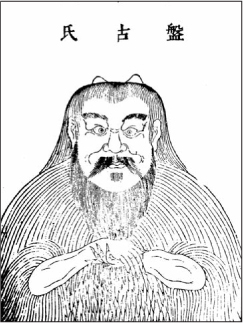East Asian Mythology: China and JapanThe Chinese War in Heaven, Creation, and Flood |
What is the Chinese creation myth? |
There are several creation myths in China, just as there are various pantheons. One of the most popular involves the divine first human, Pangu, the Chinese equivalent of the Vedic Purusha. The Pangu myth is at once a cosmic-egg and an animistic world-parent creation story. Born in the unformed chaos of the pre-creation world, Pangu found himself in what was, in effect, a giant cosmic egg, in which he gradually formed the heavens and the earth over an 18,000-year period. Pangu was extremely tall. When the egg finally burst, Pangu uncoiled himself as the heaven rose up and the earth sank below. A later myth relates how when Pangu finally died, his body became the universe. One of his eyes became the sun, the other the moon; his voice became thunder; his blood became rivers; his body hair plants; and so forth. Pangu resembles other world parents whose very bodies animated the universe, figures such as such as Purusha in India, Ymir in Iceland, and several corn mothers in Native North American mythology.

Pangu (shown in a 1607 illustration), a creation myth world parent from China who creates the world in a kind of cosmic egg.
